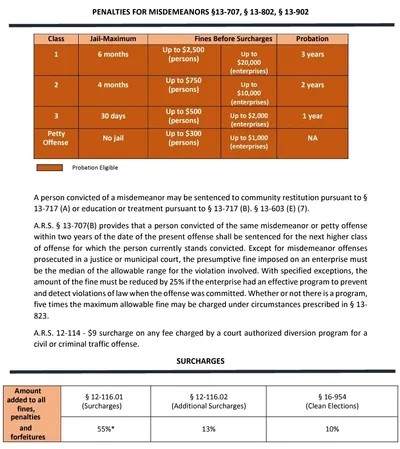Understanding Misdemeanor Assault


In Arizona, misdemeanor assault can be charged as either class 1, 2 or 3 misdemeanor. A class 1 misdemeanor is the most serious misdemeanor, and a class 3 misdemeanor is the least serious misdemeanor in Arizona. Many people are surprised to learn that in Arizona assault can be charged for simply touching someone else or by even trying to harm someone and being unsuccessful.
Practical Examples of Misdemeanor Assault
When some people think of assault, they think of a situation like a bar fight or maybe even a domestic violence type situation. Let’s take the hypothetical situation of a bar fight as an example and go through it:
Let’s say John is at a bar with his friends and is enjoying himself. Out of nowhere, an intoxicated Ian comes up to John and starts yelling at him for no real apparent reason. In an effort to intimidate John, Ian bumps shoulders with him. Then, Ian (mad that John isn’t mad) takes a swing at John and John ducks the punch. Realizing that he is John Wick, Ian quickly punches John in the head causing John to have a black eye and then John Wick beats up Ian and the bouncers throw him out of the bar.
Okay—in this situation, has the intoxicated Ian committed assault? The answer is yes. How many ways has Ian committed assault? The answer is all three. Ian committed assault when he:
- Bumped John’s shoulder to intimidate him (class 3 misdemeanor),
- Took a swing at John and missed (class 2 misdemeanor), and
- When Ian connected with his punch to the head (class 1 misdemeanor).
To better understand, we can look to what language of the assault law is in Arizona for all three classes of misdemeanor assault.
Misdemeanor Assault – ARS 13-1203
Class 1 Misdemeanor Assault in Arizona: The government must prove that you intentionally, recklessly, or knowingly caused physical injury to the alleged victim. Physical injury legally means the impairment of someone’s physical condition.
Class 2 Misdemeanor Assault in Arizona: The government must prove that you intentionally placed someone in reasonable apprehension of imminent physical injury. There is no requirement that the alleged victim be touched at all. All that’s needed is for someone to reasonably believe that they’re going to be injured.
Class 3 Misdemeanor Assault in Arizona: The government must prove that you knowingly touched a person with the intent to injure, insult, or provoke. For this level of assault, no injury to the alleged victim is required.
Penalties and Defenses To Misdemeanor Assault
Additional Information

The following are the maximum penalties for each given class of misdemeanor. While these penalties are possible penalties, lower-level consequences are often negotiated for during the plea agreement process or during sentencing. Also, many jurisdictions have what’s known as deferred prosecution (or diversion) programs. These types of programs allow for a person to complete some classes or other rehabilitation and in return for successful completion, the prosecution will dismiss the charges.
Class 1 Misdemeanor
6 months jail, ARS 13-707(1).
$2500 (plus an 83% surcharge), ARS 13-802(A).
3 years of probation, ARS 13-902(5).
Class 2 Misdemeanor
4 months jail, ARS 13-707(2).
$750 (plus an 83% surcharge), ARS 13-802(B).
2 years of probation, ARS 13-902(6).
Class 3 Misdemeanor
1 month jail, ARS 13-707(3).
$500 (plus 83% surcharge), ARS 13-802(C).
1 year of probation, ARS 13-902(7).
Self Defense and Other Defenses to Assault
Assault charges do not equal an assault conviction. Many times, our office has seen these charges dismissed based upon common defenses to assault. For example, sometimes the alleged victim simply lied about what happened and the government took them at their word. Also, sometimes the alleged assault is an honest accident, and the accused does not have the required state of mind to commit the assault. Through a defensive investigation, these truths can be brought to surface in building a rock-solid defense. That’s what I do best.
Would John Wick be guilty of assault in the above hypothetical bar fight? The answer is no because he was justified to use physical force under Arizona law.
Self-defense justifies assault in Arizona so long as it is within the bounds of the law. One of Arizona’s self-defense laws can be found in ARS 13-404. Arizona law states that a person is justified in threatening or using physical force against another when and to the extent a reasonable person would believe that physical force is immediately necessary to protect himself against the other’s use or attempted use of unlawful physical force. However, there are exceptions. The threat or use of physical force is not justified:
- in response to verbal provocation alone,
- to resist an arrest that the person knows or should know is being made by a peace officer or by a person acting in a peace officer’s presence and at his direction, whether the arrest is lawful or unlawful, unless the physical force used by the peace officer exceeds that allowed by law; or
- If the person provoked the other’s use or attempted use of unlawful physical force, unless both the person withdraws from the encounter or clearly communicates to the other his intent to do so reasonably believing he cannot safely withdraw from the encounter; and the other nevertheless continues or attempts to use unlawful physical force against the person.
Also, a person is justified in defending another person with the threat or use of physical force if the other person themselves would have been justified in the use of physical force.
What do I do if I am Charged with Misdemeanor Assault?
If you or a loved one is charged with misdemeanor assault in Arizona, you should contact a knowledgeable criminal defense attorney right away. Attorney Steven Scharboneau will discuss your case with you free of charge. Even if you do not hire him, he will point you in the right direction. You can contact Steven HERE or you can call or text him 24/7 at (480) 363-0090.







